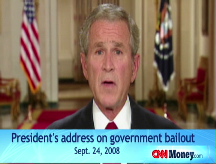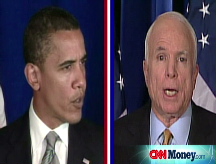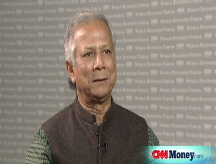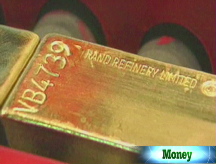Treasurys mixed as bailout takes shape
Fate of the government's $700 billion plan moves closer to approval after key lawmakers from both parties agree to terms.
NEW YORK (CNNMoney.com) -- Treasury prices were mixed Thursday afternoon as negotiations over the government's immense rescue plan for the financial sector appeared to inch closer toward completion and stocks rallied.
Prices for short-term notes and the 30-year long bond rose, while the benchmark 10-year note fell.
Bond prices have been all over the place as the financial and economic landscape has changed dramatically over the past week.
As the financial crisis wreaked havoc on the economy and some of the biggest names on Wall Street, investors jumped out of stocks and into the perceived safety of government bonds, sending Treasurys higher. But when the government announced its unprecedented bailout plan, prices tumbled as investors grew optimistic that the financial system would finally get some major help.
While the plan was still being hammered out Thursday, key Democrats and Republicans from the House and Senate said they had agreed on a bailout deal, which they planned to present to Treasury Secretary Henry Paulson.
After President Bush delivered a speech on Wednesday night pleading with the American public and Congress to understand the urgency of supporting the financial markets, momentum gained that the bailout would be passed in one form or another imminently. That optimism sent stocks rallying, with the Dow surging more than 200 points.
Growing sentiment that the bailout will soon become reality "takes a little bit of heat off the fear trade," said William Larkin, portfolio manager at Cabot Money Management. "We are not seeing a huge pullback, but a slight pullback."
The benchmark 10-year note fell 7/32 to 101 9/32, and its yield rose to 3.84% from 3.80% late Wednesday. Treasury prices and yields move in opposite directions.
But the 30-year bond edged up 12/32 to 101 25/32, and its yield rose to 4.39% from 4.38%.
The 2-year note fell 1-2/32 to 99 22/32, while its yield rose to 2.16%.
The yield on the 3-month bill jumped to 0.74% from 0.52% as prices ticked lower. Yields on 3-month Treasurys have been at very low levels as demand for the notes has increased amid the uncertainty in the financial markets. The 3-month note is a popular asset for money markets looking for stability because it offers a safe place to park cash on a short-term basis.
Supply jolt: On Wednesday, the government sold $34 billion in 2-year notes, which was the largest Treasury auction in history. There were more than $75 billion in bids offered for the $34 billion worth of notes offered.
On Thursday, the government auctioned $24 billion worth of 5-year notes. The Treasury received bids totaling nearly $46 billion, with a median yield of 3%. After the auction's close, the price of the 5-year note ticked down 19/32 to 100 12/32, and its yield rose to 3.04%.
In order to pay for a costly rescue plan, the government would need to sell a lot more bonds. "The Treasury market is going to be confronted with a lot of supply," said Peter Cardillo, Chief Market economist at Avalon Partners. And that will likely cause prices to ease.
In addition, the bailout plan would be inflationary for the U.S. dollar. When the value of the dollar falls, fixed income investments become less attractive. Therefore, if the bailout plan passes, "the Treasury is going to bump up the money supply [and] the printing presses will run on all cylinders," said Cardillo.
Another analyst said that inflation concerns were not part of the bond market's bigger picture. "Inflation is really off the table," said Larkin. "It is a very low level concern," in comparison with worries about a slow economy with frozen credit systems, he said.
Bailout plan: Supporters of the plan $700 billion bailout plan, which was first unveiled by Bush Saturday, argued that the nation's economy cannot afford to let the beleaguered financial sector fall further under the weight of bad assets. But opponents have cautioned against giving the government a blank check of such unprecedented size.
"There will be uncertainties, but the plan will relieve the credit crisis," said Cardillo.
The proposed plan "does not kill all the ills," he added, but it would bolster confidence on Wall Street and mitigate some of the flight-to-quality traffic that the bond market has seen. "The unclogging of the credit market relieves the flight to quality" purchase, said Cardillo.
Even if a bailout package is passed, "maybe people can continue to stay defensive," said Larkin. Investors will remain cautious. "As we approach solutions, people are going to take baby steps back into the marketplace," said Larkin. ![]()







